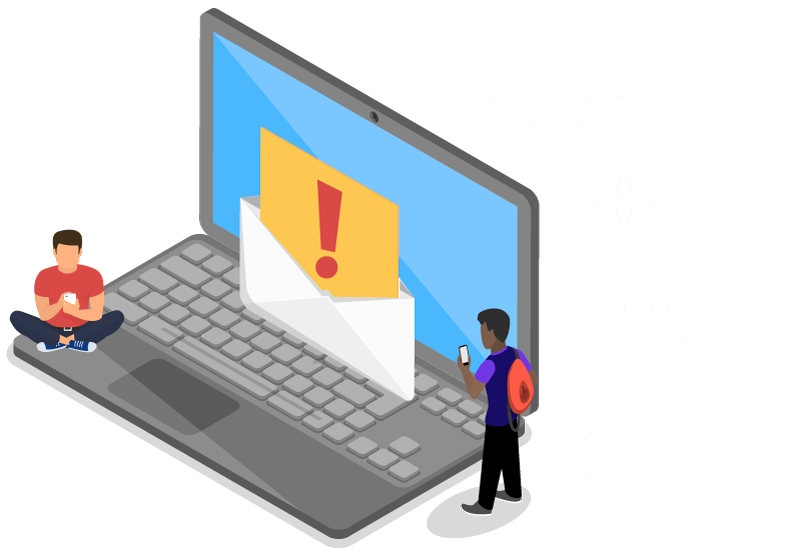Tech Safety tips for teens.
Safety, equality and respect are important, even with online relationships and social media followers. Learn more about searching, browsing and connecting safely.

If you need help now, call 911.
WARNING!
If you are being stalked or abused, take steps to keep your abuser from knowing you are looking for help. Please use a public computer, or call 911, one of Delaware’s local hotlines at 302-762-6110 for New Castle County or 302-422-8058 for Kent & Sussex
Emergency “Quick Escape” Button
There is a Quick Escape button in the upper right-hand corner of every page on this website. Click this button if your abuser enters the room while you are viewing this website. It will close this website and redirect your browser to a neutral page.
Internet Safety
Everything you do online is recorded. It is IMPOSSIBLE to clear your tracks completely. Your devices can store hundreds of bits of information about everything you do with your computer or phone, including information about which websites you’ve visited, your passwords, and what your emails say. An abuser can easily track the websites you visit or read your email messages.
If you suspect your activities are being monitored, they probably are. Abusers are often controlling and want to know your every move. You don’t need to be a computer programmer or have special skills to monitor someone’s online activities – anyone can do it and there are many ways to monitor your activities – even without having direct access to your computer or phone. Using a separate computer is best, but you can protect yourself at home by familiarizing yourself with processes like private browsing, deleting your browser history, clearing your cache and deleting cookies.
Social Media Safety
Just like the websites you visit may be saved in your browser history, what you post on social media accounts may be visible to an abuser. Be sure to check your audience permissions and manage your privacy settings for any social media accounts.
Additionally, your phone’s
Remember: You can be tracked!
Your computer and cell phone use can be monitored without you knowing it. Your history can never be completely erased from a computer or device, even if you browse in “private” or “incognito” mode.
If you try to erase your tracks, your abuser might become suspicious, so if you think you might be in danger, use a computer at a public library or school, or ask to use a trusted friend’s phone or computer.
If your abuser sends you an email, do not open it on those computers or phones to reduce the chance of tracking.
If the computer or email account asks if you would like it to save your password or login information tell it NO.
Need someone to talk to?
Delaware 24-hour Relationship Violence Hotlines
New Castle County: (302) 762-6110
Kent/Sussex Counties: (302) 422-8058
24-hour Relationship Violence Hotline (en español): (302) 745-9874
Delaware 24-hour Sexual Assault Hotlines
YWCA SARC (New Castle/Sussex Counties): (800) 773-8570
Contact Lifeline Crisis Helpline (Kent/Sussex Counties): (800) 262-9800
LoveIsRespect.org
24-hour Relationship Violence Hotline: (866) 331-9474
24-hour Relationship Violence Text Line: Text LOVEIS to 22522
24-hour Relationship Violence Online Chat: www.loveisrespect.org
National Sexual Assault Hotline
(operated by RAINN)
24-hour Sexual Assault Hotline: (800) 656-HOPE
24-hour Sexual Assault Online Chat: www.online.rainn.org
Email Safety
Email is not a safe or confidential way to communicate.
Sending email is like sending a postcard through the mail. Anyone along the path can read what it says.
If you need to talk to someone about the danger or abuse in your life, if possible, please call a hotline instead.
If you must use email to discuss your situation we suggest you use an account that your abuser doesn’t know about. Set up a new account with a free email service like Hotmail, Yahoo, or Gmail.
Password Safety
Be smart about passwords to keep your abuser out of your accounts.
DO NOT use a name or password that contains any identifying information (no names, nicknames, initials, birthdates, zipcodes, etc.) Instead use a name and password that contains a random mix of letters, CAPITAL letters and numbers (for example, HJ3v67Tn) –
Make sure you can remember the username and password. If you must write it down somewhere, put it in a place your abuser is unlikely to find it.
If the computer or email account asks if you would like it to save your password or login information tell it NO.
Find Help Now
Helping Others
Are you a teacher, parent, coach, counselor or other caring adult looking to help a teen in your life? Explore our list of resources and materials.
Need more info?
We're here to help answer questions or provide additional resources if needed.
